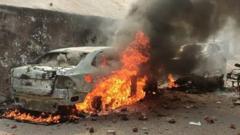Sambhal city in Uttar Pradesh is on high alert following violent clashes that left three dead and dozens injured on Sunday. These incidents occurred during a court-ordered survey of the historic Jama Masjid, a Mughal-era mosque, leading to confrontations between police and protesters. Authorities arrested 21 individuals in connection with the unrest and suspended internet services while schools remained closed for a day to prevent further outbreaks of violence.
The survey was mandated by a local court in response to a petition asserting that the mosque was constructed on the ruins of an earlier temple. This situation escalated quickly; videos shared on social media depicted a chaotic scene with debris like bricks and slippers scattered across the area. Protesters allege that police firing resulted in the deaths of three men, although UP Police Superintendent Krishan Kumar refuted these claims, stating that "no weapons were used that could take anyone's life."
This incident is part of a broader trend in India, where Hindu nationalist groups have long asserted that many mosques were built on the sites of former temples destroyed during the Mughal period. Ongoing legal battles between Hindu and Muslim groups over similar claims have intensified community tensions across the nation. Protests began brewing in Sambhal earlier in the week after the court authorized the mosque survey, prompting reactions from local Muslim groups who argued they were not sufficiently informed about the process.
When a second survey took place on Sunday morning, tensions escalated as protesters congregated near the mosque, leading to angry confrontations and stone-pelting directed at police. In response, law enforcement utilized tear gas and plastic bullets to control the situation. Identified victims of the violence, Naeem, Bilal, and Nauman, reportedly succumbed to bullet wounds sustained during these altercations.
Opposition leaders have criticized the ruling Bharatiya Janata Party (BJP) government, alleging the violence was politically motivated, a claim denied by state officials. Uttar Pradesh's Deputy Chief Minister, Brajesh Pathak, emphasized the government’s commitment to maintaining law and order, stating, "No one is allowed to take law into their own hands." Mahmood Madani, the president of the Jamiat Ulama-i-Hind, urged for peaceful resolutions to such disputes while highlighting that these conflicts violate Indian laws.




















